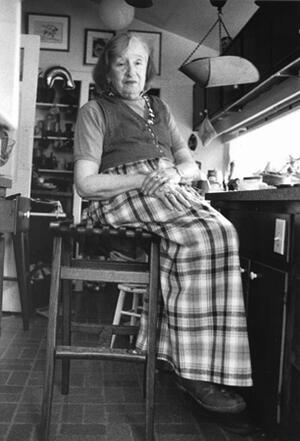Esta Maril
Social worker, innovator and arts enthusiast, Esta Maril has focused endless energy on enhancing the social welfare of children and promoting the arts. Born in 1921, Esta's childhood was heavily influenced by her mother's role as the family's main breadwinner. Esta majored in English at Johns Hopkins University and spent summers working at Hutzler's Department Store. Believing that her life had been too sheltered, Esta pursued social work, graduating with a master's degree from the University of Pennsylvania in the 1940s. Esta directed a mental health clinic in Baltimore County and worked in private practice before her marriage in 1948 to Herman Maril, whom she met through their mutual interest in art. Following the birth of their children, David and Nadja, Esta worked at The Park School, creating a mother-tot program that emphasized the socialization of young children and parenting skills for mothers. Esta and her husband spent summers actively involved in the community of artists in Provincetown, Massachusetts. Since Herman's death in 1986, Esta has been organizing her husband's archives and art collection and is writing an account of the couple's lifelong involvement in the arts.
Esta details her family history and how her family came to settle in Baltimore. Her mother, Pauline Shapiro, immigrated to the United States from France. Esta's father, Jerrold Lyle Cook, was born to musical parents in New Madrid, Missouri. Her paternal grandmother, Sadie Green Cook, sang in the choir of her Nashville synagogue. She was the matriarch of the Cook family. Sadie was also a terrific cook and passed many recipes on to Esta. Esta explains that her parents were introduced through a family connection and were married after World War I. Esta says her father was bright but not a hard worker. When she thinks of her Jewish heritage, she says it was very matriarchal; women were the strong ones who managed the household. Esta describes her childhood home, a row house near Druid Hill Lake with an outhouse, and the neighborhood where she grew up. During the Depression, Esta remembers the women in her family feeding the homeless and the hungry. Her household included her mother’s youngest sister, her paternal grandparents, and an occasional boarder. She vividly remembers the family meals, prepared mainly by her grandparents, including chicken soup, seafood, and many desserts. Esta’s mother worked outside of the home, which was uncommon then; she ran a printing office. Esta recalls walking to her public school, sometimes accompanied by her grandfather and the boy who lived next door. During her schooling, she had some health problems, which set her back as a student even though she was very bright. Esta talks about attending Baltimore Hebrew School, being confirmed, and attending Sunday school every week. She describes their Hanukah celebrations and seder traditions. Her family went to synagogue for the High Holidays; Esta’s mother had to drag her father there. Esta’s mother was active in Oheb Shalom and the United Order True Sisters. For financial reasons, Esta chose an in-state school; while working part-time, she attended Johns Hopkins in the afternoon and evenings and graduated in three and a half years with a degree in English. Esta reminisces about Hopkins fondly; she had an excellent experience with wonderful teachers and friends. After college, Esta found herself drawn to social work. She worked for one year with the Department of Public Welfare and commuted to the University of Pennsylvania during World War II, earning a master’s of social work in 1942. Esta specialized in children’s welfare and social work, got her clinical credentials. Esta also took art classes at the Maryland Institute of Arts, where she met her husband, Herman Maril, a well-known artist and professor. He taught at the University of Maryland for over thirty years. She describes her marriage to Herman, raising children, balancing their work and family commitments, growing in their respective careers, and spending summers in Cape Cod. After she was married, Esta served as the head of the mental health clinic in Baltimore County. Herman died in 1986, and since his death, Esta has managed his art collection and personal papers. Finally, she reflects on the lives and accomplishments of her children and grandchildren.



